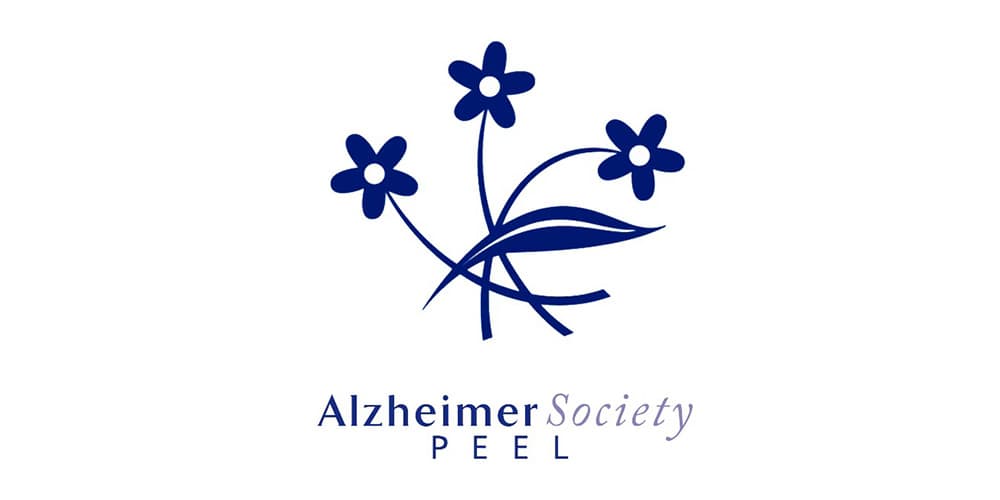
Our Promise
We aim to advance dementia care and support for CarePartners through inclusive, equitable, sustainable and accessible services. We deliver our promise by focusing on five pillars:
- Delivering service excellence
- Hiring exceptional people
- Development of leadership and community partnerships
- Being fiscally responsible
- Driving innovative care

Accessibility Plan 2025
Alzheimer Society Peel (ASP) understands that people with disabilities may have different needs; therefore, we continuously strive to improve the identification, removal and prevention of barriers faced by persons with disabilities. ASP is committed to ensuring we are meeting the accessibility needs of people with disabilities promptly.
If an accommodation is required, staff members, volunteers, students, and contractors must advise their supervisor of their disability-related needs related to their duties. ASP will work with the individual to best accommodate their needs.
Our guidelines that we follow include the following:
- ASP’s Accessibility Officer will complete the Annual Accessibility Status Report.
- ASP will continue to identify and remove barriers as outlined in our Accessibility Plan.
- New staff must read and review the Accessibility Training Guide during orientation and annually thereafter.
- All ASP's facilities and services are designed as inclusively as possible (i.e., ramps, emergency evacuation chairs, wheelchair accessible washrooms, etc.). However, accommodation is a shared responsibility.
- Everyone involved, including the person requesting an accommodation, must work together; exchange relevant information and look for accommodation solutions.
- Staff must provide clients/caregivers who require support to access our services with the resources.
- ASP will create an individualized emergency response plan for anyone with a disability who requires assistance in an emergency (i.e., during a fire drill, evacuation, or lockdown). Each situation will be handled case-by-case, and all collected information will be kept private and confidential.

Bill of Rights
- The Client Bill of Rights reflects Alzheimer Society Peel’s Mission, Vision, Values and Guiding Principles.
- As a service provider, ASP shall ensure that the following rights of persons receiving community services are fully respected and promoted. A person receiving a community service has the right to be dealt with by the service provider in a courteous and respectful manner and to be free from mental, physical and financial abuse by the service provider.
- A person receiving a community service has the right to be dealt with by the service provider in a manner that respects the person’s dignity and privacy and that promotes the person’s autonomy.
- A person receiving a community service has the right to be dealt with by the service provider in a manner that recognizes the person’s individuality and that is sensitive to and responds to the person’s needs and preferences, including preferences based on ethnic, spiritual, linguistic, familial and cultural factors.
- A person receiving a community service has the right to information about the community services provided to them and to be told who will be providing the community service.
- A person applying for a community service has the right to participate in the service provider’s assessment of their requirements and a person who is determined under the Act to be eligible for a community service has the right to participate in the service provider’s development of the person’s plan of service, the service provider’s review of the person’s requirement and the service provider’s evaluation and revision of the person’s plan of service.
- A person has the right to give or refuse consent to the provision of any community service.
- A person receiving a community service has the right to raise concerns or recommend changes in connection with the community service provided to them and in connection with policies and decisions that affect their interests, to the service provider, government officials or any other person, without fear of interference, coercion, discrimination or reprisal.
- A person receiving community service has the right to be informed of the laws, rules and policies affecting the operation of the service provider and to be informed in writing of the procedures for initiating complaints about the service provider.
- A person receiving community service has the right to have their records kept confidential in accordance with the law. 1994, c. 26, s. 3(1).

Person-Centred Language
What is Person-Centred Language? Why is it important?
We use a person-centred approach to dementia care to respect each individual's unique history, preferences and needs. It helps maintain their dignity, promotes well-being, and supports better communication and relationships by focusing on the person, not just the condition.
Use of Carepartner vs Caregiver
Using CarePartner instead of caregiver emphasizes a more equal, respectful relationship. It highlights collaboration and mutual support, rather than a one-way dynamic where only one person is giving, and the other is passive. This language encourages dignity, autonomy, and shared decision making, which are especially important in dementia care.
Learn More
https://clri-ltc.ca/files/2020/04/Summary-of-Person-Centred-Language.pdf
Take the PLEDGE!!
https://www.behaviouralsupportsontario.ca/pledge
Allied Health Professions
A category of health professionals that provide various diagnostic, preventive, therapeutic, and rehabilitative services in connection with health care. While no international standard defines the diversity of allied health professions, they are typically considered distinct from medicine, nursing, and dentistry.
Health Care Provider
A health care provider is an individual or organization licensed to provide healthcare services, including diagnosis, treatment, and care.
Partner in Care
A "partner in care" refers to including family members or loved ones in a person's healthcare journey, recognizing them as valuable members of the care team.
Caregiver
A person who provides direct care (for children, elderly people, or the chronically ill).
CarePartner
A "care partner" is a term that describes a person who supports another individual with various aspects of their care, often in a partnership-like relationship.
Use of Person Living with Dementia vs Individual Living with Dementia
The phrase "person living with dementia" is generally preferred over "individual living with dementia" because it emphasizes the person's identity as a whole, rather than focusing solely on their condition. Using person-centred language helps maintain dignity, focuses on the person's strengths and abilities, and minimizes the condition's impact on their identity.

Canadian Charter of Rights for People with Dementia
As a person living with dementia, the Charter can help you stand up for your rights. These include the rights to live free of stigma, participate in policies that affect you, and more.
To learn more, click here.
https://alzheimer.ca/en/get-involved/change-minds/canadian-charter-rights-people-dementia

Privacy
Protecting Your Privacy and Personal Information at the Alzheimer Society Peel (ASP), we are committed to safeguarding the privacy and dignity of those using our services. We do not share confidential information without your consent, unless required for legal or professional obligations. Our practices align with the Personal Health Information Protection Act, 2004 (PHIPA) and the Personal Information Protection and Electronic Documents Act (PIPEDA).
Accountability and Transparency
ASP is responsible for protecting the privacy of the personal health information we manage, in accordance with PHIPA. All staff, contractors, consultants, volunteers, and students are expected to comply with our privacy policies. The Chief Executive Officer and Privacy Officer are ultimately responsible for ensuring our privacy practices are followed.
Collection and Use of Information
As part of providing healthcare, we gather personal health information from you or someone designated as your substitute decision-maker. We may also receive information from healthcare professionals involved in your treatment. We use this information to provide care, manage the healthcare system, improve service quality, conduct research, offer training, support fundraising, and fulfill legal or regulatory requirements. Examples of how we may use your information include:
- Evaluating and monitoring our programs
- Educating our staff to improve care
- Contacting you to gather feedback on your experience with our services.
Disclosure of Information
Your personal health information may be shared with other healthcare professionals involved in your care. If you cannot provide consent, we may discuss relevant information with your substitute decision-maker to obtain their consent for ongoing treatment. We only allow access to your information for individuals accessing their own electronic records or third parties who provide proper documentation. In exceptional circumstances, such as threats of harm, we may release electronic records without documentation.
Except as the law requires, we typically release records in summary form prepared by our staff. Access to actual records can only occur in the presence of staff, and copies will not be provided unless legally mandated.
Consent
By sharing your personal health information with us, you consent to its use and sharing with those involved in your care. You have the right to refuse if you choose not to provide or share specific information. However, this may affect our ability to deliver quality care, or we may be legally required to disclose certain information. We will discuss any potential consequences with you. If we need to disclose your information for purposes beyond your healthcare, we will inform you and seek your consent.
Expressed Consent
In some cases, we need explicit permission to share your health information. For example, we will ask for your consent before sharing information with non-healthcare professionals, such as an insurance company or employer, or for purposes other than providing your healthcare. Third parties receiving your information may only use it for the purpose it was given or as required by law.
Decisions on Your Behalf
Unless we determine otherwise, we assume you can make decisions about your health information. If you cannot make these decisions, a designated substitute decision-maker will be asked to make them on your behalf. The law outlines the order of individuals who can be your substitute decision-maker. We will ask for their consent before sharing your health information. You may also designate someone to make decisions on your behalf in the future.
Notices
We display notices at various locations across our sites to explain why we collect, use, and disclose your personal health information, and how you can obtain further details.
Accuracy
We strive to keep your personal health information accurate, complete, and up to date, considering how it will be used and your interests.
Safeguards
We maintain strict security measures to protect your personal health information. All staff and volunteers must sign an agreement to comply with our privacy policy. We use current technology to safeguard your information and regularly monitor our internal practices. When we work with third-party service providers, they must adhere to privacy standards similar to ours.
Access and Correction
You have the right to access your personal health information by submitting a written request to our Privacy Officer. We will respond within 30 days, though additional time may be required for complex requests. You may request a correction if you believe there is an error in your information. In cases where we cannot correct the information ourselves, we will guide you on how to proceed.
Client Recording
To protect the safety and privacy of all individuals involved, we have established guidelines around photo, audio, and video recording. Recording is generally permitted only with the express consent of all recorded individuals. Unauthorized recording is strictly prohibited.
Inquiries and Complaints
If you have any questions about our privacy practices or wish to file a complaint regarding our compliance, contact our Information and Privacy Officer at (905) 278-3667, ext. 357. You can also submit a formal complaint to the Information and Privacy Commissioner/Ontario at:
Information and Privacy Commissioner/Ontario
2 Bloor Street East, Suite 1400
Toronto, ON M4W 1A8
(416) 326-3333

Land Acknowledgement
We would like to begin by acknowledging the land on which we gather, and which the Region of Peel operates, is part of the Treaty Lands and Territory of the Mississaugas of the Credit. For thousands of years, Indigenous peoples inhabited and cared for this land, and continue to do so today. In particular we acknowledge the territory of the Anishinabek, Huron-Wendat, Haudenosaunee and Ojibway/Chippewa peoples; the land that is home to the Metis; and most recently, the territory of the Mississaugas of the Credit First Nation who are direct descendants of the Mississaugas of the Credit. We are grateful to have the opportunity to work on this land, and by doing so, give our respect to its first inhabitants

